Shining Bright
With Clara (Cape, Hbk, £17.99), a fictionalised account of Clara Schumann’s life, Janice Galloway moves out of Scotland and onto the world stage. Her earlier novels were smaller, closely examined efforts with Scottish settings or protagonists. Clara is a different sort of beast altogether – one akin to a nineteenth-century leviathan. Clara Schumann, as well as being the wife of Robert Schumann and mother of their eight children, was an accomplished concert pianist and composer. Her intensely passionate relationship with Robert gradually transforms under the strain of his repeated breakdowns: Clara takes on the role of carer. Galloway depicts her as a woman chopped to pieces by her disparate roles as mother, wife, carer, pianist and composer, her creativity stifled and subsumed by domestic life. To approach the novel’s larger themes of musical creativity, romanticism, mental breakdown and the creative life, Galloway uses the narrative devices of an only partially knowing narrator and the erratic breakdown of typography to evoke its mental equivalent.
 Right: Scottish Literature in the Twentieth Century (Scottish Cultural Press, pbk, £29.99), edited by David McCordick, is the third volume from SCP anthologising English-language Scottish literature. It concentrates on ‘free-standing’ texts rather than excerpts and will be of particular use to students.
Right: Scottish Literature in the Twentieth Century (Scottish Cultural Press, pbk, £29.99), edited by David McCordick, is the third volume from SCP anthologising English-language Scottish literature. It concentrates on ‘free-standing’ texts rather than excerpts and will be of particular use to students.
Pharos (Virago Hbk £15.99), Alice Thompson’s new novel, swims in and out of the mind like dreams just before waking. The central character is the lighthouse, Jacob’s Rock, where the light must never go out; other characters take their solitary sojourn there and nature rails against its steadfast stand but Jacob’s Rock remains the only fixed point in this mesmerising tale. Cameron, a stern biblical man is the keeper of the lighthouse and Simon, a younger, more animistic figure is his assistant. When a woman is washed ashore, Cameron and Simon take her in. Lucia has no idea of who she is or how she came to be there. Her lack of history acts like a luminous nebula illuminating all in its passing, and throwing the other shape shifting characters into sharp relief. Pharos is a ghost story where the edges between dark and light, and reality and illusion weave in and out of each other, creating a novel that will continue to haunt long after you put it down.
Hy Brasil (Canongate, Pbk, £9.99), will not. Most of Margaret Elphinstone’s novels explore mythical spaces. Her previous novel, The Sea Road, did this successfully, perhaps because the story and its setting had a kind of harshness and stripped-back reality that demanded clear prose for its telling. Hy Brasil, on the other hand, is a mythical island which has fascinated writers and musicians for years with its almost Arthurian lushness of mythical topography and history. Elphinstone explores the idea that modern mapping techniques have proved rather than disproved the existence of Hy Brasil, and so when Sidony Redruth wins a writing competition she is sent to Hy Brasil to write its first guidebook. On her arrival, she is flung headlong into a tortuous, political arena and a torrid love affair Heavily laced with boy’s own adventure, piracy, drug smuggling and more, the book would need a heavy dose of irony to avoid a James Bond meets Camelot motif. It suffers from its absence.
 Left: Scottish Writers Talking 2 (Tuckwell Press, pbk, £9.99) offers a series of long interviews with Iain Banks, Bernard MacLaverty, Naomi Mitchison, Iain Crichton Smith and Alan Spence. The interviews, recorded over a period of sixteen years by the redoubtable Isobel Murray, provide ‘a thoughtful window on each writer’s mind’.
Left: Scottish Writers Talking 2 (Tuckwell Press, pbk, £9.99) offers a series of long interviews with Iain Banks, Bernard MacLaverty, Naomi Mitchison, Iain Crichton Smith and Alan Spence. The interviews, recorded over a period of sixteen years by the redoubtable Isobel Murray, provide ‘a thoughtful window on each writer’s mind’.
In Regi Claire’s The Beauty Room (Polygon, £8.99), Celia Roth’s mother has died and Celia has wasted no time in throwing back the shutters and applying wild and jarring combinations of colours to the walls, right down to the inner sanctum, her mother’s beauty room. As the layers of paint go on and the family history unfolds, Celia’s repressed sexuality emerges with a bristling electricity that fairly crackles off the pages. When a bunch of black tulips is delivered to her door and with the growing realisation that some-one is watching her, Celia is forced to confront her past rather than cover or escape it. In facing her family history Celia has to come to terms with her ambivalent grief for a mother who hasn’t shown her love but has demanded it in abundance. Strange and menacing, there is some beautiful writing in The Beauty Room.
Copyright Clare Simpson 2005.

Comments